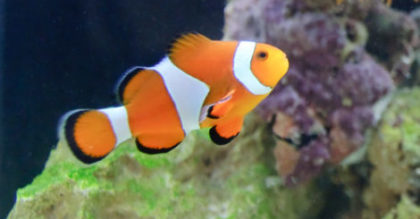
 )
)I know I’m a little late for Father’s Day, but I thought you might be interested in this article about parenting among bony fishes. It’s a summary of this paper from last October, exploring the evolution of father-only care, a parenting style much more common underwater than it is here on land. The reality of that care is far from Finding Nemo‘s charming songs and walks to school. Real fish dads’ guidance often ends where the movie begins, with the hatching of the eggs. Still, the sheer number of fish species which exhibit this behavior and the contrast with how other animals rear their young makes for an interesting puzzle to solve.
We’ve known for a while about the parenting activities of fish dads, but the question is why fish behave this way more than other animals. This latest research tried to answer that question by looking at how the behaviors line up with the phylogenetic tree of various species. They found that parental involvement appeared in 30 separate lineages. That sort of convergence suggests a feature which is fairly straightforward to evolve, perhaps because some underlying capacity already exists in an ancestral population(s) and just needs the appropriate conditions to be fully realized. Based on past experience, I expect some might also question whether such convergence implies something other than common descent. In any event, those 30 lineages also feature external fertilization, which may give the male fish greater connection to specific eggs and greater incentive to see that they hatch.
Now, just because some fish fathers are more fins-on than the fish mothers, and just because monkeys and macaws and monitor lizards might opt differently, doesn’t mean we need to take parenting advice from any of them. Our observations can tell us what those animals do and possibly what is reproductively advantageous, but not what we should do. Not only because of the is-ought distinction, but also because humans are distinct creatures with our own developmental needs. For example, we’ve talked before about the notion that full-term humans are nevertheless born 17 months premature, a reference to significant physical and cognitive development that takes place outside the womb. Consequently, we need lots of parental supervision and care just to make it to the point of being able to get around and feed ourselves, a stage fish reach much sooner after hatching.
And while we’re on parenting puzzles, here’s some research on another one: dinosaur eggs. Specifically, why don’t we find more of them, relative to the number of bones we find? The answer may be that a number of dinosaurs laid soft-shelled eggs. Those eggs are much less likely to fossilize. That alone is cool enough, especially with the story of the find that led prompted the hypothesis. But it is also interesting to read about what else we can infer about dinosaurs and their parenting behaviors based on the types of eggs they laid. Who knows what other stories fossils have to tell?
I am not yet aware of a recording of last week’s webinar with Brown Church author Robert Chao Romero, but a written summary is now available.
Andy has worn many hats in his life. He knows this is a dreadfully clichéd notion, but since it is also literally true he uses it anyway. Among his current metaphorical hats: husband of one wife, father of two teenagers, reader of science fiction and science fact, enthusiast of contemporary symphonic music, and chief science officer. Previous metaphorical hats include: comp bio postdoc, molecular biology grad student, InterVarsity chapter president (that one came with a literal hat), music store clerk, house painter, and mosquito trapper. Among his more unique literal hats: British bobby, captain’s hats (of varying levels of authenticity) of several specific vessels, a deerstalker from 221B Baker St, and a railroad engineer’s cap. His monthly Science in Review is drawn from his weekly Science Corner posts — Wednesdays, 8am (Eastern) on the Emerging Scholars Network Blog. His book Faith across the Multiverse is available from Hendrickson.

Leave a Reply